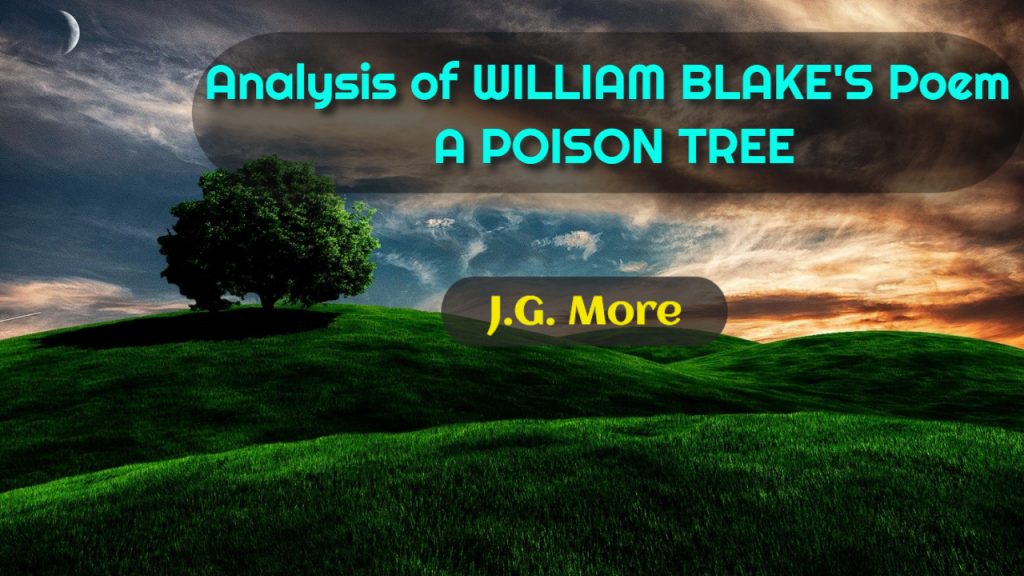Analysis of WILLIAM BLAKE'S Poem: A POISON TREE
A Poison Tree is a poem written by the famous romantic poet William Blake. The poem is taken from his collection of poems called, Songs of Innocence and Of Experience. The poem, A Poison Tree is included in the Songs of Experience section which consists of 26 poems and this section is about how the experiences of adult life destroy innocence in our hearts. In this particular poem, the poet’s heart is filled with anger for his enemy.
A Poison Tree by William Blake
I was angry with my friend;
I told my wrath, my wrath did end.
I was angry with my foe:
I told it not, my wrath did grow.
And I waterd it in fears,
Night & morning with my tears:
And I sunned it with smiles,
And with soft deceitful wiles.
And it grew both day and night.
Till it bore an apple bright.
And my foe beheld it shine,
And he knew that it was mine.
And into my garden stole,
When the night had veild the pole;
In the morning glad I see;
My foe outstretched beneath the tree.
At the beginning of the poem, the poet gives the example of two types of anger… one is expressed and the other one is an unexpressed or suppressed anger and he elaborates his theory by giving two examples. He says once when he was angry with his friend, he expressed his anger towards him and then his anger ended there. This means, when his wrath was eroded like the volcano from his heart, he felt peaceful inside and therefore his wrath ended there.

The same thing happens with all of us when we express our anger, we feel quite relieved. Expressing anger puts an end to the negative emotions and these negative emotions are replaced by the feeling of forgiveness! We turn into bigger human being and try to forget what just happened. The poet also went through a similar phase of emotions when he expressed his anger towards his friend but when he got angry with his enemy, he did not express his anger rather he suppressed it. Later on, this suppressed anger captivates his heart and mind and his anger keeps growing. In such a situation, it is very difficult for one to forget and forgive, as eventually it gives rise to the feeling of revenge. The same way, due to his unexpressed anger the poet’s feeling of revenge keeps growing.

The poet has used two metaphors in this poem one is the metaphor of the tree and the other one is the metaphor of an apple. The poet knows that more than his enemy his own mind is more responsible for his poisonous feelings. The enemy had hurt him for one time but the poet kept hurting himself all the time by remembering that moment when his enemy hurt him. He nourished the feeling of hatred by spending hours, thinking about the ill that had been caused to him by his enemy. The poet says that slowly all his negative emotions transformed into a big poisonous tree and his negative emotions fed the poisonous tree. The poet further says that though his heart was filled with anger and hatred still he never let others know it. He concealed all his anger and hatred with his smile. He used his smile to hide his real emotions therefore, his anger kept growing inside.

Finally, the poisonous tree produced an apple it was a bright red apple and it was a result of his hatred towards his enemy. Here the apple is a symbol of the poison in his heart. There was nothing in the world that could calm his anger and therefore he was not able to forgive his enemy. One day, his enemy saw the bright red apple which grew on the poisonous tree in the poet’s garden. As soon as the enemy sees the apple, he knows that it belonged to the poet… still the enemy couldn’t keep his eyes away from that bright red apple. The apple was filled with all the poison in the poet’s heart and the enemy decides to eat it and one dark night the enemy sneaks into the garden of the poet and eats the poisonous apple from the poisonous tree which eventually causes the death of the enemy and when the poet wakes up in the morning and finds the dead body of his enemy lying under the poisonous tree; the poet gets very relieved and his revenge was finally complete.

The poem teaches us that negative emotions like anger should not be suppressed instead of that they should be expressed. The negative emotions can result in something very dangerous and unpleasant. Even a good human being can turn into an evil by such suppressed emotions. The negative emotions always result in negative action as these emotions start growing day by day and one day they explode and something terrible happens. The negative emotions take away one’s peace of mind. The poem talks about the demerits of anger and how anger leads to the destruction and corruption of the human mind.

